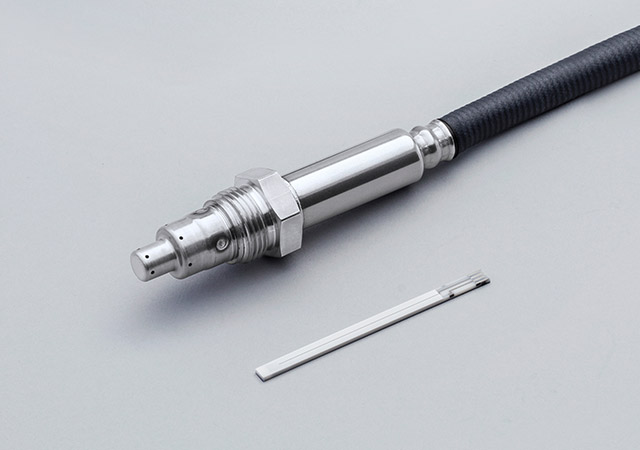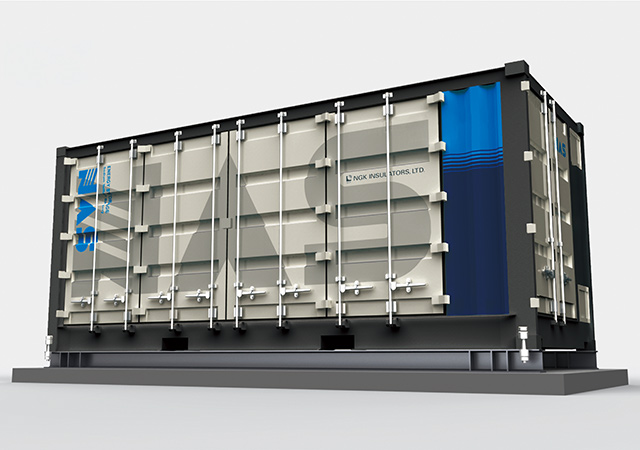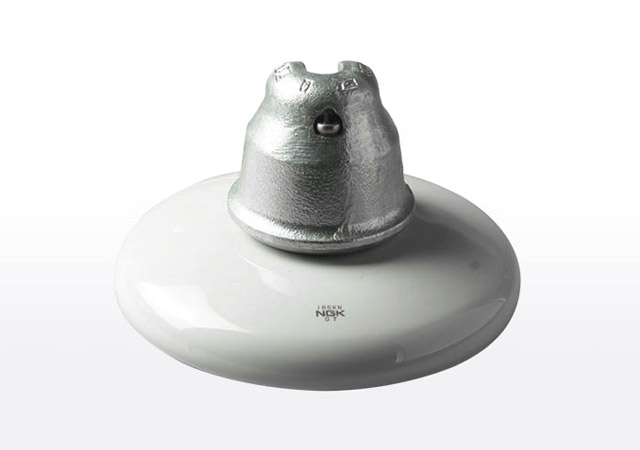About NGK
Management Policies
Basic Management Policies of the Company
The NGK Group Philosophy and NGK Group Vision: "Road to 2050" that we adhere to are as follows:
NGK Group Philosophy
Our Mission
“Enriching Human Life by Adding New Value to Society.”
Our Values
“Quality of People: Embrace challenges and teamwork”
“Quality of Products: Exceed expectations”
“Quality of Management: Social trust is our foundation”
NGK Group Vision: "Road to 2050"
We look ahead to a future society in 2050, taking the major trend towards carbon neutrality and the explosive evolution into a digital society as an opportunity for further development. We will work on driving Five Transformations: [1] Promotion of ESG management, [2] Profitability improvement, [3] Focus on R&D, [4] Focus on commercialization, and [5] Digital transformation (DX). With “Surprising Ceramics” as the slogan for our unique ceramic technologies, we intend to convert our business structure toward the “Third Foundation.”
Targeted Management Indicators and Capital Policy
The NGK Group is pursuing management that prioritizes capital efficiency based on return on equity (ROE) as one of our key management indicators. We employ return on invested capital (the NGK version of ROIC), which is closely linked to ROE, as a management indicator, and use business assets (accounts receivable, inventories and fixed assets) in lieu of invested capital, and operating income in lieu of after-tax operating income, to allow our business divisions to proactively take control of their targets. In addition to improving the profitability of our existing business, we aim to achieve profit growth by maintaining and improving the sales growth rate by focusing on R&D and marketing with the goal of “New Value 1000”, which is to achieve sales of new commercialized products of at least 100 billion yen by 2030. Aiming to achieve a minimum medium-to long-term target ROE of 10%, we will implement a capital policy that is conducive to the sustained enhancement of corporate value by accommodating changes in business risks. We will strive to reduce capital costs through communication with shareholders and investors, as well as conducting the decision-making process for business planning and capital investment, to secure earnings exceeding capital costs. We will also work on active shareholder returns, reviewing our payout ratio and dividend on equity (DOE) ratio. Through these efforts, we aim to maintain sound levels of profitability, capital turnover, and financial leverage, which are components of ROE, consistent with our business strategy while maintaining financial health of the Company.
Furthermore, as a management indicator that contributes to improving our corporate value, we use NGK Value-added, which takes into account CO2 emission costs, labor costs, R&D expenses, and ESG target achievement rate in operating income. In addition to fulfilling a wide range of social responsibilities, including efforts to reduce environmental load and respect human rights, we will actively invest in human capital and R&D, the sources of our future competitiveness, while striving to increase added value so that we can steadily realize profit growth.
Medium-to Long-Term Management Strategies and Issues to Be Addressed
It remains difficult to gauge the future prospects of the environment surrounding the NGK Group amid protectionism by countries and escalating global economic tensions due to the fluctuating nature of Russia’s invasion of Ukraine and the conflicts in the Middle East. On the other hand, from a medium- to long-term perspective, the direction toward carbon neutrality remains unchanged amid the mounting social demand for decarbonization, as evidenced by the formulation of a CO2 emissions trading system. In addition, the development of a digital society is progressing at an accelerated pace as both the public and private sectors continue to make large- scale contributions to sophisticate information technology, such as through the utilization of artificial intelligence (AI) and big data.
With the aim of becoming a corporation that adds new value to society, the Group has set “A Company to contribute to carbon neutrality and a digital society with our unique ceramic technologies” as what it wants to be in the NGK Group Vision. Accordingly, the Group is pushing forward with the “Five Transformations” to bring the vision into being. In January 2025, at a meeting of the Board of Directors, the Company resolved to remove the term “Gaishi (INSULATORS),” which is the business that the Group started with at the time of its founding, from the name of the Company and to unify its name in both Japanese and English as “NGK” with the aim of accelerating the transformation of its business structure, on the condition that a partial amendment to the Articles of Incorporation is approved at the 159th Annual Shareholders’ Meeting scheduled for June 26, 2025. Although the market for automotive-related products, which constitute the Group’s core business, is also expected to shrink in the medium- to long-term as electrification advances, the Group will work on the “Advancement of ESG management” and “Enhancement of the earnings capability of existing businesses and creation of new businesses” in a bid to expand the lineup of products related to both carbon neutrality and a digital society toward the future society of 2050, thereby steadily advancing the transformation of its business structure.
The NGK Group’s initiatives for key issues are as follows:
Advancement of ESG management
The Group has placed ESG at the center of its corporate management to drive sustainable growth and transformation into what it wants to be in the future. Based on the NGK Group philosophy of “Enriching Human Life by Adding New Value to Society”, we will contribute to the realization of a sustainable society by providing new value through our unique ceramic technology, thereby meeting the expectations of society and gaining the trust of society. This is the NGK Group’s basic approach to sustainability. To realize the NGK Group philosophy, we aim to contribute to carbon neutrality and the realization of a digital society, while bearing in mind ESG (Environment, Society and Corporate Governance) and SDGs (Sustainable Development Goals), and to achieve sustainable corporate value.
In addition, the NGK Group has 35 Group companies (including 18 manufacturing companies) operating in 18 countries overseas. In order to achieve these goals and enhance management transparency and autonomy, we are working to improve the environment so that all group employees can act in accordance with fair values and international standards of judgment. As part of these initiatives, the Group established the “NGK Group Corporate Business Principles,” which set forth the Company’s stance toward fulfilling its social responsibility with a high ethical standard, and the “NGK Group Code of Conduct,” which lays out the path for executives and employees to follow while complying with relevant laws and regulations, international rules, and the spirit thereof both domestically and internationally. In addition, we are ensuring thorough familiarity with them throughout the Group.
Under the Sustainability Management Committee chaired by the President, the Board of Directors will appropriately supervise initiatives for the NGK Group’s sustainability issues, including ESG elements, with the aim of earning the trust of all stakeholders.
Environment (E)
Holding up the goal of achieving net zero CO2 emissions by 2050, the Group has formulated the “NGK Group Environmental Vision,” which is formed around making a contribution to carbon neutrality, a recycling-oriented society and harmony with nature. Based on it, the Group has compiled the “Carbon Neutrality Strategic Roadmap” and the “Five-year environmental plan” as concrete action plans and is striving to fulfill the goals therein. In fiscal 2025, the final year of the 5 year plan, we expect to achieve our target of 550,000 tons of CO2 emissions in Scope 1 and Scope 2 (a 25% reduction from fiscal 2013 levels). We also aim to achieve our milestone (an interim target) of 370,000 tons of emissions in fiscal 2030 (a 50% reduction from the same level) by switching to renewable energy sources for electricity use, primarily at overseas sites, and installing solar power generation facilities at domestic and overseas manufacturing sites. In addition, in order to achieve the target ahead of schedule, we are developing technologies for firing ceramics with carbon-neutral fuels such as hydrogen and ammonia, gas separation membranes and DAC (Direct Air Capture) to directly capture CO2 in the atmosphere, and conducting demonstration tests of methanation for CO2 recycling. We are engaged in developing products and services related to carbon neutrality through actions including application of such technologies within the Group. To finance development related to carbon-neutrality, we issued green bonds (unsecured corporate bonds) in November 2024 for the fourth consecutive year. Additionally, we have commenced an initiative to reduce greenhouse gas emissions through the value chain. Setting a Scope 3 CO2 emissions reduction target of at least 90% by 2050 (compared to fiscal 2022), we received a certification from the SBT (Science Based Targets) Initiative regarding our plan for a 25% reduction by 2030 as a step toward achieving the above target. We are disclosing information related to the Task Force on Climate-related Financial Disclosures (TCFD) on our website, etc. and have expressed our support as an early adopter of the Task Force on Nature-related Financial Disclosures (TNFD) in relation to efforts to coexist with nature. In parallel, we are expanding and enhancing our disclosure of related information. In February 2025, we were also newly selected as an A-list company, the highest rating for “CDP Water Security,” by CDP, which is an international non-profit organization.
Society (S)
The NGK Group will expand initiatives to respect human rights in its companies and supply chains, thereby contributing to the creation of a society in which the human rights of all people affected by business activities will not be violated. Not only did the Group establish the “NGK Group Human Rights Policy” based on the “United Nations’ Guiding Principles on Business and Human Rights” but it also disclosed a statement on the UK Modern Slavery Act. Furthermore, the Group endorses “Children’s Rights and Business Principles” and has declared that the Group will respect children’s rights in business activities and engage in social contribution activities and others for the promotion of children’s rights. In the NGK Group Philosophy, the NGK Group positions “human resources that challenge and enhance each other” as one of our goals, and strives to realize our mission of “Enriching Human Life by Adding New Value to Society” and to work on “five reforms” toward realizing the NGK Group Vision. In order to achieve these goals, it is essential that each and every human resource plays an active role. Based on “NGK Group Human Capital Management Policy”, the “Human Resource Development Policy”, and the “Internal Environment Development Policy”, we are promoting the enrichment of human resources who are engaged in five reforms through recruitment and training sessions, and the creation of an environment where such human resources can fully demonstrate their capabilities. In April 2025, we revised the personnel system for those in managerial positions to align the treatment of employees with their job descriptions, regardless of their age or years of service. Through these and other initiatives, we will promote the active participation and self-driven actions of diverse human resources. In addition, we are continuously deploying various measures including creating an internal work environment through flexible work styles utilizing telecommuting and reduction of long working hours. In a bid to promote the advancement of women, we have set numerical targets for the percentage of female new college graduates hired and are expanding the scope of their responsibility in the organizations that they are assigned or transferred to. We have implemented a system to support early return from parental leave to encourage employees who took maternity and childcare leave to resume their careers early. In addition to systems such as providing training for employees returning from childcare leave and expansion and improvement of childcare leave for male employees, we have been working on creating an environment that allows women to thrive through organizing internal lectures that aim for deeper understanding of balancing work and family responsibilities. In respect of human resources overseas, approximately 60 percent of a total of about 20,000 employees of the Group are stationed overseas. We believe the advancement of local human resources is essential for prompt and appropriate decision-making based on the circumstances, culture and practices in each local community for management of the NGK Group. Therefore, we actively hire local human resources and assign them to senior management-level positions at overseas sites.
NGK has announced the “Declaration of Partnership Building” promoted by the Cabinet Office and the Small and Medium Enterprise Agency. In order to conduct fair and equitable transactions with the procurement partners that make up the supply chain in the NGK Group’s supply chain, as well as to achieve prosperity together, we have established the “NGK Group Procurement Policy” with “openness and fairness, partnership, and relationship with society” as the basic axes of procurement, taking into consideration global environmental conservation, respect for human rights, and the working environment. Moreover, in order to realize sustainable procurement throughout the supply chain, we formulated the “NGK Group Supplier Code of Conduct” and assess risk and CSR details for sustainable procurement through visits to our business partners, questionnaires on the actual state, and other means.
Governance (G)
With regard to corporate governance, in light of enhancing the functions of the Board of Directors, the Company appoints independent outside directors who can contribute to the Company’s sustainable growth and mid- to long-term improvement of corporate value. The number of independent outside directors is one-third or more of the total members of the Board of Directors. The Company also founded the Business Ethics Committee, whose primary members are outside directors, and it handles response to fraudulent acts or violations of laws and regulations where the officers and others of the Company have been involved and provides response, reports and advice to the Board of Directors. The committee strives to strengthen the compliance system by establishing a whistleblowing system (“Hotline”), which is directly linked to the Business Ethics Committee. This serves as a mechanism to prevent any such fraudulent act or violation of laws and regulations in addition to the existing Helpline System, which provides advice and receives reports from employees.
From the compliance perspective, the Company are ensuring thorough familiarity with the “NGK Group Corporate Business Principles,” and the “NGK Group Code of Conduct,” as guidelines for all members of the NGK Group to conduct sound business activities based on a sense of ethics. Moreover, the “Basic Guidelines for NGK Group Compliance Activities” are in place with the aim of establishing a mechanism for evaluating and verifying its compliance activities, taken in various domains, in light of international norms and for continuous improvement based on shared understanding and values.
With regard to compliance with laws and regulations within and outside Japan, such as the Competition Law and the Foreign Corrupt Practices Law, top management sends out messages continually, compliance education is provided to executives and employees at domestic and overseas group companies, a program for compliance with the Competition Law in line with international standards is underway, and we are also promoting the use of the “Competition Law Compliance Handbook.” The “NGK Group Anti-corruption Policy” was newly established in April 2024, further enhancing the initiative for corruption prevention in all business activities.
Regarding quality compliance, we have been working on improving our organizational culture and business processes through measures such as the promotion of dialogue between top management and employees, thorough provision of education, and a shift to a mechanism that generates no excessive burden or waste in workplaces, in addition to providing mechanisms such as direct guidance by top management at meetings of the quality committee. In terms of safety of the working environment, the Company works on reducing work-related injuries by strengthening the control capability of each site across the NGK Group in addition to identifying significant accident risks and enhancing preventative measures through conducting risk assessment of the NGK Group companies in and outside Japan.
In respect of risk management, risks that are deemed significant from the perspective of management are classified into external environmental, strategic, and operational risks, and continually reviewed. We have established various committees to manage individual risks, including sustainability issues, within the NGK Group. As environmental changes are accelerating both in Japan and overseas, in order to establish an integrated risk management system from a company-wide perspective that spans across divisions and connects to the Board of Directors, the “Risk Management Committee” was established in fiscal 2023 as a supervisory committee under the direct control of the President, and we are considering countermeasures for priority follow-up risks after obtaining approval from the Board of Directors.
Improving earning capacity of existing businesses and creating new businesses
The Group has developed a business portfolio policy in order to enhance corporate value from a company-wide perspective and carefully examines businesses from two perspectives: profitability measured using the NGK version of ROIC and growth potential that employs a net sales growth rate. We consider investing management resources in core businesses and business groups where future growth is anticipated. In addition, we evaluate the quantitative aspects of businesses in the low-growth, low-profit categories based on annual and medium-term business plans and discuss their growth potential, profitability, etc. from a long-term perspective at internal strategy meetings, etc., which are supervised by the Board of Directors due to their nature as important matters concerning company management. To decide on capital investments, we take into account the payback time of individual investments and the NGK version of ROIC as well as evaluations from the perspective of ESG that uses the internal carbon prices (ICP). In order to balance further sustainable profit growth with investment in human capital and intellectual capital, which will be the source of future corporate value, and at the same time comprehensively evaluate sustainability initiatives such as efforts to reduce environmental impact and respect human rights, we have introduced NGK Value-added as a management indicator, which takes into account CO2 emission costs, labor costs, R&D expenses, and ESG target achievement rate to operating income. We will link this to the enhancement of corporate value from the perspective of both financial value and non-financial value, which is not presented in financial statements, by raising short-term profitability, medium- to long-term growth potential and ultra-long-term social nature in a balanced manner.
In order to improve the profitability of each business, we will appropriately pass increased costs associated with global inflation on to selling prices, and at the same time, we are advancing the initiative of “manufacturing ∞ (chain) innovation” to further enhance our profitability. We are advancing the sophistication of manufacturing systems and global collaboration by utilizing digital technology, focusing on “production innovation activities” that bridge the gap between the ideal and the current situation in the manufacturing chain and “cost reduction activities”, which improve manufacturing costs by reducing losses at each factory. And, in response to soaring raw material and fuel costs and fluctuations in demand, we will lead to stronger profitability by further reducing costs, shortening lead times, and reducing inventory.
The entire NGK Group will accelerate DX promotion under the NGK Group Digital Vision. In the development and marketing fields, in addition to the manufacturing field, we are driving the creation of value through means such as materials informatics, which shortens the lead time in the development of new materials, utilization of the IP landscape for our patent strategy, and acceleration of the search for new applications using our original AI technology that pairs our elemental technology (seeds) and social issues (needs) with high accuracy. Simultaneously, on a company-wide basis, including the head office and indirect divisions, we boost efficiency in business processes by building an interactive AI system, which learns internal information and is for our exclusive use, and using it alongside generative AI that operates in the cloud environment. Through this initiative, we will advance reforms toward the reduction of fixed costs as well as data-based business execution and decision making.
As transforming the business structure requires the creation of new business, we have set up “New Value 1000” as the key measure to boost net sales of newly commercialized products to a minimum of 100 billion yen in 2030. Three business groups, namely, Corporate NV Creation, which is tasked mainly with the marketing function, Corporate R&D, which has the Group’s unique differentiating technologies, including ceramics materials technology and elemental technology, and Corporate Manufacturing Engineering, which is responsible for manufacturing technology and engineering, will reinforce their coordination with each business division to accelerate the process from “R&D” to “Product blossoming.” Regarding R&D, we plan to invest 300 billion yen over the ten years from 2021 in accordance with the “NGK Group Vision,” 80% of which will be allocated to carbon neutrality and digital society-related projects. We have decided to focus management resources on promising themes for the future that will help solve social issues, and plan to inject 36 billion yen in fiscal 2025, marking the highest level in our history. Additionally, in order to create more influential differentiating technologies while accelerating the speed of development, we will engage in concurrent development that involves Corporate Manufacturing Engineering at an early stage. Furthermore, we strive to actively push forward with the creation of new products and businesses that utilize alliances with external parties through means such as M&A involving companies that are expected to generate synergies with our businesses and technologies, as well as investment in venture capital funds and start-ups, thereby advancing the transformation of the business structure. In February 2025, we reached an agreement with Deutsche KNM GmbH, a German company, to acquire their shares. We will strengthen our competitiveness by fusing the engineering capabilities and knowledge of membrane equipment possessed by Borsig GmbH Group, which is under the umbrella of Deutsche KNM GmbH, with our ceramic technology.
Priority issues by segment are as follows.
Environment Business
Although the U.S. tariff policy is expected have negative effects on automotive sales, the Group intends to accommodate increased demand for its products against the backdrop of tightening exhaust gas regulations and others in countries, improve productivity and optimize its global manufacturing system with the aim of ensuring that the Group maximizes profit. The growth rate of EVs is slowing down. However, in order to respond to further regulatory tightening in the world in the short-term, primarily in Europe, based on the projection that the internal combustion business will decline in the future, the Group will not only make preparations for mass-production of gasoline censors, a new product line, but also seek to capture potential demand that transcends the framework of the existing market by driving the development of new products such as CO2 sensors. We will continue to review prices with an eye on a medium- to long-term decline in demand and make progress in maintaining earnings levels or raising them. On the other hand, for markets related to carbon neutrality, which are expected to expand globally, we will focus on initiatives to realize the early commercialization of products and facilities that contribute to society’s environmental needs, such as Direct Air Capture (DAC), which directly captures CO2 in the atmosphere, and CO2 separation membranes, which separate CO2, nitrogen, hydrogen, etc. at the molecular level. As a business that broadly encompasses environment-related matters, we will contribute by introducing high value-added products and technological innovation.



Digital Society Business
In business fields related to a digital society, as described in the NGK Group Vision, despite signs of a slowdown in the global economy, the utilization of artificial intelligence (AI) and big data has spread steadily. Regarding ceramic packages and DCB/AMB substrates, whose profit/loss situation has deteriorated due to a market slowdown, we will further review our business strategy in order to enhance competitiveness and profitability. On the other hand, in the medium- to long-term, due to the advancement of IoT and the sophistication of communications, products related to semiconductors and electronic components are expected to continue to shift to higher functionality with their markets projected to expand. Regarding products for semiconductor manufacturing equipment and electronic components, in addition to developing next-generation products and cultivating customers, we will continue to make capital investments with an eye on the medium to long term in order to accommodate growing demand. We will launch new products such as new next-generation composite wafers to respond to further advancements in the communications field, as well as Translucent alumina ceramics that help to enhance the functionality of semiconductors, and aim to broaden our product lineups that contribute to a digital society.



Energy & Industry Business
With the ongoing trend toward decarbonization, it is assumed that the significance of the role of storage batteries will increase in the medium- to long-term. On the other hand, the shift to clean energy is currently decelerating, partly due to an economic downturn in Europe. NAS batteries of the Energy & Storage Business, for which demand had been expected to grow, are projected to face a tough business environment for a while. Although a step has been taken to suspend some of the manufacturing processes in plants and the bleeding is expected to continue, we project that demand for NAS batteries will expand in the future in a market that appreciates their features, including large capacity, long life and long-hour charge/discharge. We will solidify the system with BASF, a partner, to improve earnings in an effort to contribute to solving social issues. In addition to the existing “selling of goods”, we will focus on selling “products as services”, which provides services and value, as a new business area. For example, we will launch VPP service, which uses NAS batteries to control energy resources in an integrated manner using IoT technology to balance power supply and demand. For insulators, capital expenditure related to electric power generation at home and overseas is underway in a stable manner through building new data centers and expanding existing ones. We will run this business efficiently to maximize returns even with a downsized business structure.


Through these initiatives, the Group will work to further reinforce its management base and continue conducting corporate management with emphases placed on capital efficiency and shareholders, while aiming to become what it wants to be in the future through sustainable growth and enhancement of corporate value.
(Excerpt from Summary of Consolidated Financial Results for the Year Ended March 31, 2025)
